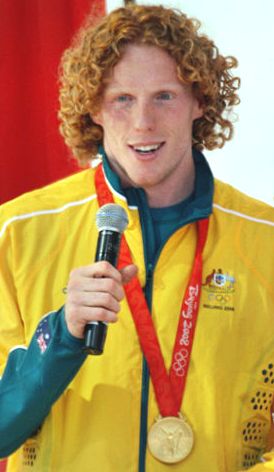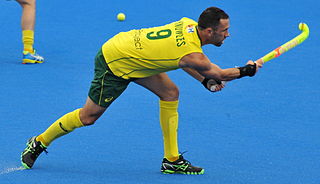Related Research Articles

The Commonwealth Games is a quadrennial international multi-sport event among athletes from the Commonwealth of Nations. The event was first held in 1930 and, with the exception of 1942 and 1946, has successively run every four years since. The event was called the British Empire Games from 1930 to 1950, the British Empire and Commonwealth Games from 1954 to 1966, and British Commonwealth Games from 1970 to 1974. Athletes with a disability are included as full members of their national teams since 2002, making the Commonwealth Games the first fully inclusive international multi-sport event. In 2018, the Games became the first global multi-sport event to feature an equal number of men's and women's medal events, and four years later they became the first global multi-sport event to have more events for women than men.
Kieren John Perkins, OAM is a former Australian freestyle swimmer. He specialised in the 1500-metre freestyle and won successive Olympic gold medals in this event in the 1990s. He won his first at the 1992 Olympics which he won in world record time and then at the 1996 Olympics when he defended his title. In total he won four Olympic medals.
Susan O'Neill, is an Australian former competitive swimmer from Brisbane, Queensland, nicknamed "Madame Butterfly". She achieved eight Olympic Games medals during her swimming career.

Kurt Harry Fearnley, is an Australian wheelchair racer, who has won gold medals at the Paralympic Games and crawled the Kokoda Track without a wheelchair. He has a congenital disorder called sacral agenesis which prevented fetal development of certain parts of his lower spine and all of his sacrum. In Paralympic events he is classified in the T54 classification. He focuses on long and middle-distance wheelchair races, and has also won medals in sprint relays. He participated in the 2000, 2004, 2008, 2012 and 2016 Summer Paralympic Games, finishing his Paralympic Games career with thirteen medals. He won a gold and silver medal at the 2018 Commonwealth Games and was the Australian flag bearer at the closing ceremony.
Sport in New Zealand largely reflects the nation's colonial heritage, with some of the most popular sports being rugby union, rugby league, cricket, association football, basketball, horse racing and netball, which are primarily played in Commonwealth countries. New Zealand has enjoyed success in many sports, notably rugby union, rugby league, cricket, America's Cup sailing, world championship and Olympics events, and motorsport.

Netball is the most popular women's team participation sport in Australia. In 1985, there were 347,000 players. In 1995, there were over 360,000 Australian netball players. Throughout most of Australia's netball history, the game has largely been a participation sport; it has not managed to become a large spectator sport. In 2005 and 2006, 56,100 Australians attended one to two netball matches. Of these, 41,600 were women. 46,200 attended three to five netball matches, with 34,400 of those spectators being women. 86,400 attended six or more netball matches, with 54,800 spectators being female. Overall, 188,800 people attended netball matches, with 130,800 being female. In 2005 and 2006, netball was the 10th most popular spectator sport for women with Australian rules football (1,011,300), horse racing (912,200), rugby league (542,600), motor sports (462,100), rugby union (232,400), football (212,200), harness racing (190,500), cricket (183,200) and tennis (163,500) all being more popular. The country set an attendance record for a Netball match with a record crowd of 14,339 at the Australia–New Zealand Netball Test held at the Sydney Super Dome game in 2004.

Steven Leslie Hooker OAM is an Australian former pole vaulter and Olympic gold medalist. His personal best, achieved in 2008, is 6.06 m making him the fourth-highest pole vaulter in history, behind Sergey Bubka, Renaud Lavillenie and Armand Duplantis.

Sally Pearson, OAM is a retired Australian athlete who competed in the 100 metre hurdles. She is the 2011 and 2017 World champion and 2012 Olympic champion in the 100 metres hurdles. She also won a silver medal in the 100 m hurdles at the 2008 Summer Olympics and the 2013 World Championships.
Ronald George "Ron" Harvey, is a former senior Australian public servant and sport administrator. He was the third director of the Australian Institute of Sport, serving in the role from 1987 until 1989.

The 2018 Commonwealth Games, officially known as the XXI Commonwealth Games and also known as Gold Coast 2018, was an international multi-sport event for members of the Commonwealth that was held on the Gold Coast, Queensland, Australia, between 4 and 15 April 2018. It was the fifth time Australia had hosted the Commonwealth Games and the first time a major multi-sport had an equal number of events for male and female athletes.
Russell Andrew Mark, is an Australian Olympic Champion Shooter. He won the Olympic gold medal in double trap at the 1996 Summer Olympics in Atlanta. He also won an Olympic silver medal at the 2000 Summer Olympics in Sydney. He has competed at six Olympic Games: 1988, 1992, 1996, 2000, 2008, 2012. The only Australian Summer Olympian to compete in more Olympiads is Andrew Hoy, who competed in seven.
Paralympics Australia (PA) previously called the Australian Paralympic Committee (APC) (1998–2019) is the National Paralympic Committee in Australia for the Paralympic Games movement. It oversees the preparation and management of Australian teams that participate at the Summer Paralympics and the Winter Paralympics.

Blake Cochrane, is a retired Australian Paralympic swimmer. He won a silver medal at the 2008 Beijing Paralympics, two gold medals at the 2012 London Paralympics, a silver medal at the 2016 Rio Paralympics, and a silver and one bronze medal at the 2020 Tokyo Paralympics.

Brendan John Burkett, OAM is an Australian swimmer who won five medals at four Paralympics and a silver medal at the 1994 Victoria Commonwealth Games.

Jamie Dwyer is an Australian field hockey player. He currently plays for YMCC Coastal City Hockey Club in the Melville Toyota League in Perth, Western Australia. He also played for the Queensland Blades in the Australian Hockey League. He debuted for Australia as a junior player in 1995, and for the senior side in 2001. He has played over 350 matches for Australia and scored over 220 goals. He has represented Australia at the 2004 Summer Olympics where he won a gold medal and the 2008 Summer Olympics and 2012 Summer Olympics where Australia won bronze medals. He has also represented Australia at the 2006 Commonwealth Games where he won a gold medal and the 2010 Commonwealth Games where he also won gold. He has won silver medals at the 2002 Men's Hockey World Cup and the 2006 Men's Hockey World Cup. He won a gold medal at the 2010 Men's Hockey World Cup and the 2014 Men's Hockey World Cup. He is widely regarded as one of the greatest players to ever play the game.

Mark William Knowles is the Australian field hockey captain. He has played professional hockey in the Netherlands for HC Rotterdam. He plays for the Queensland Blades in the Australian Hockey League. He has been the captain of the Australia men's national field hockey team the Kookaburras since 2014. He won a gold medal at the 2004 Summer Olympics, the 2014 World Cup, the 2005 and 2012 Champions Trophy.
Perry Rothrock Crosswhite AM is a former Australian Olympic basketballer and leading sport administrator.
The organisation of sport in Australia has been largely determined by its Federal system of government – Australian Government and six states and two territories governments and local governments. All three levels play an important role in terms of funding, policies and facilities. Each major sport is managed by a national sports organisation, with state counterparts that manage community sporting clubs. Umbrella or peak organisations represent the interests of sports organisations or particular sport issues. Education sector plays a small role through universities and schools. Private sector's involvement is extensive in professional sport through facilities, club ownership and finance/sponsorship.
Commonwealth Games Australia (CGA) is the Commonwealth Games Association for Australia, and is responsible for representing and promoting the Commonwealth Sport movement in the country, and organises the participation of athletes at the Commonwealth Games and Commonwealth Youth Games. It changed it name from the Australian Commonwealth Games Association to Commonwealth Games Australia in 2015. The Commonwealth Games have been held in Australia five times, most recently the 2018 Commonwealth Games were held on the Gold Coast, Queensland.
Craig Phillips is a leading Australian sports administrator. In 2015, he was appointed the chief executive officer at Australian Commonwealth Games Association.
References
- 1 2 Willoughby, Willoughby (18 February 2012). "Mark Peters named as Games CEO". Gold Coast News. Retrieved 14 January 2013.
- 1 2 3 "Baseball man appointed Head of 2018 Commonwealth Games". Baseball Digest. 2 December 2012. Archived from the original on 17 February 2013. Retrieved 14 January 2013.
- 1 2 3 4 5 6 7 "Australian Sports Commission's New Executive Director". Australian Baseball Federation Media Release 13 November 2000. Archived from the original on 19 February 2013. Retrieved 14 January 2013.
- ↑ "Mastering injuries is test of true champs". Gold Coast News, 6 November 2012. Retrieved 14 January 2013.
- ↑ "Australian sports chief Mark Peters resigns". Australian Sports Commission Media Release, 28 August 2008. Retrieved 14 January 2013.
- ↑ "Mark Peters to head Coast's Games bid". Gold Coast News, 2 July 2010. Retrieved 14 January 2013.
- 1 2 3 "Management Team". Gold Coast 2018 Commonwealth Games Website. Archived from the original on 10 April 2013. Retrieved 14 January 2013.
- ↑ "Mark Peters". It's An Honour. Archived from the original on 4 May 2019. Retrieved 14 January 2013.
- ↑ "Queen's Birthday 2020 Honours List" (PDF). Governor-General Australia website. 8 June 2020. Retrieved 8 June 2020.